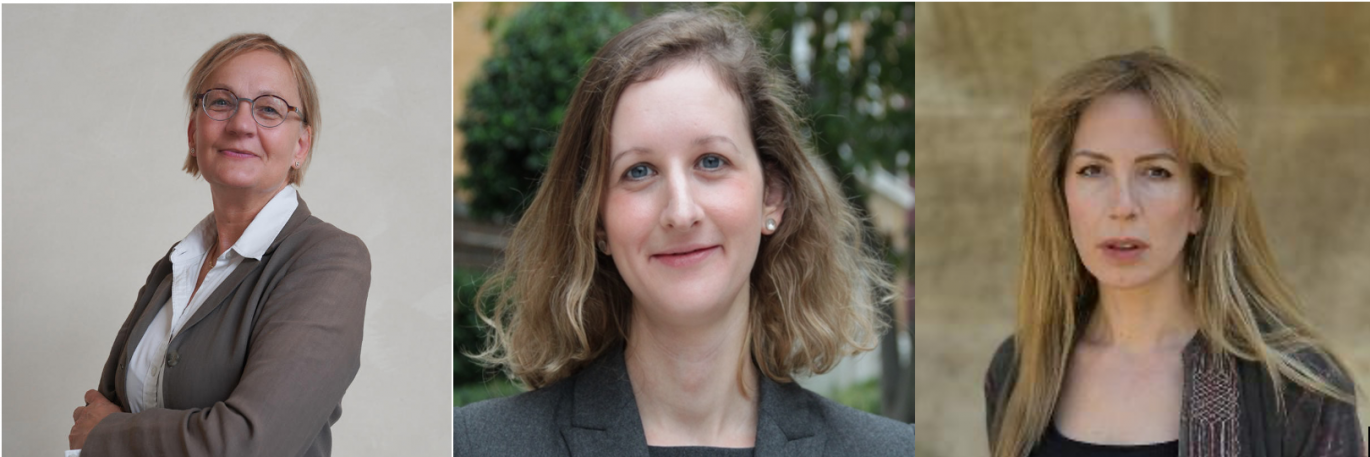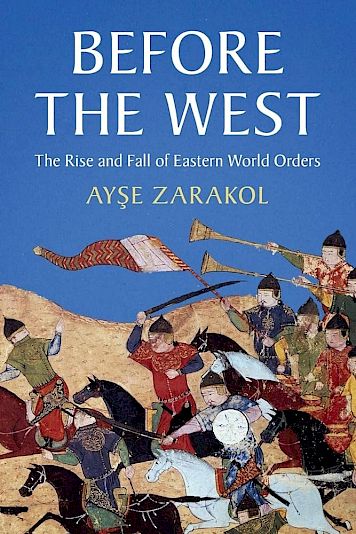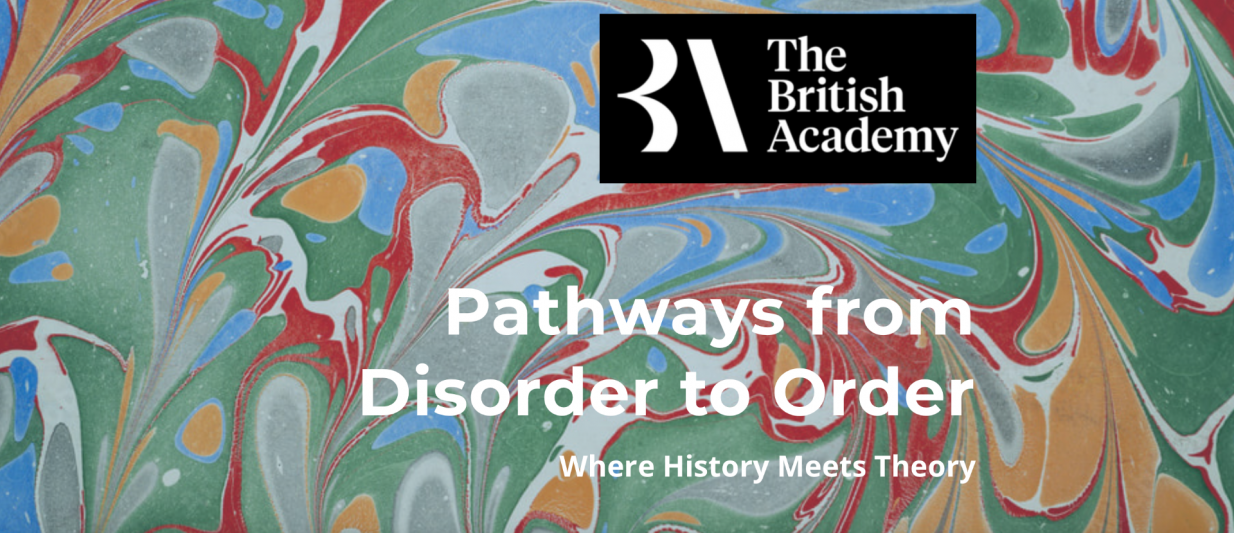Global History and International Relations: a discussion with Ayşe Zarakol, Glenda Sluga, and Heidi Tworek
IR scholars and Historians are increasingly in dialogue these days, trying to give meaning and substance to how we think about the international order, not least what it is. This conversation between Ayşe Zarakol (AZ), Heidi Tworek (HT), and Glenda Sluga (GS) engages Zarakol’s British Academy ‘Frontiers of Knowledge’ funded grant which aims to bring IR scholars and Historians together to think about disorder: Pathways from Disorder to Order: Where History Meets Theory.

GS: Welcome Ayşe, thank you for joining Heidi and myself for this discussion about global history. You are an IR scholar who has written global history of a particularly longue durée kind. Indeed, your work on the Chinggisid dynasty in the award-winning book Before the West: The Rise and Fall of Easter World Orders(Cambridge University Press, 2022), is a rather wonderful example of the potential of global history as a field. You also use it to reorientate our view of a history that isn’t ‘Western’, but also as many argued should not be reduced to being defined in relation to the West. In this endeavour, you are particularly interested in global rather than say international history, even though you are an International Relations Scholar.Can you tell us a bit about how a political scientist like yourself sees global history, and why you think it is important, for your own work, and more generally?
AZ: I think the field of International Relations (IR) could do with more history in general and a stronger historical sensibility wherein we do not just treat history as place for cases to ‘test’ our ahistorical theories. Fortunately in recent years there has been a growing awareness in IR about this and my work is certainly part of this larger turn. So while in my own work I am currently closer to global history and/or global historical sociology, I am not prescriptive about which kind of history is best for IR in general. I think it depends on the project.
For example, my first book After Defeat: How the East Learned to Live with the West (Cambridge University Press, 2011), which deals with the integration of non-Western powers into the modern international order (Turkey after WWI, Japan after WWII and Russia after the Cold War) draws much more from international history (in its discussion of how a Western-centred international order was formed in the nineteenth century and evolved after) and comparative national history (in its discussion of the respective cases).
GS: How did you come to your idea for Before the West?
AZ: In Before the West one of my goals was to think about International Relations from a non-Western perspective. As a result, I almost inevitably had to stay away from international and national history, as I had to travel to a time before the West was dominant, to a time before nation-states and the concept of the ‘international’ (even if my field presupposes both in its name). For this reason, I am closer to global history in this project.
Because one could argue that if you are working on the periods before the eighteenth, nineteenth centuries global history is a much more natural fit, even if the turn to global history has not always succeeded in leaving Eurocentrism behind (at least that is my sense as an outside observer). Methodological nationalism makes less sense the further you go back because there are not yet nations in the modern sense (same goes for modern regions).
One way IR has tried lately to fix its Eurocentrism problem, and the narrowness of its traditional historical narrative which starts with a misreading of Westphalia, is to bring histories of other countries and regions into our discussions. Such discussions focused often on China. While welcome some ways, I started worrying that there was danger of IR replacing its Eurocentrism with Sinocentrism or operating with an ahistoric notion of ‘China’ projected back into time. Put another way, I started wishing that there were accounts of the area we now call “the East” that did not privilege or naturalise present day national or regional boundaries. Eventually I decided to write the book I wished existed. All of this brought me to global history. Before the West thus focuses on wider Eurasia the period between the thirteenth and seventeenth centuries and on relations not between nations or states but “great” houses.
GS: How did you put the argument for Before the West together in relation to the empirical historical evidence?
AZ: My original starting point was the Ottomans. I was working on sovereignty and the forms the practice had taken outside of Europe. I was studying Ottoman and Islamic history because I am originally from Turkey and had some familiarity with that trajectory already, lowering my transaction costs of learning new material (little did I know what was to come!). I came upon arguments that Islamic kingship and law went under rather radical transformations in the early modern period, and some historians attributed this transformation to the influence of the Timurid and Mongol conquests earlier. I started thinking to myself that if Mongol notions of yasa (law) had such an impact on West Asia and Islam several centuries later, they possibly must have elsewhere. I thought that common thread, if it existed, could be used to construct a grand narrative of relations across “the East” and such a narrative, once constructed, could help us to say something new about the core concepts of IR.
Then it was a matter of teaching myself the historiography of different regions of Asia/Eurasia, where I was happy to find similar arguments made independently by revisionist historians of each region (in the book I also acknowledge the disagreements where they exist). I then put the trajectories together (translating the terminology of different historiographies), keeping a relational perspective, putting different narratives on the same temporal plane, as horizantally as possible because this is how they would have been experienced by the actors of each time period.
I think all of this is in the spirit of global history but also in the spirit of the macro perspective of IR. This is a node where I think the intersection of the two can be particularly fruitful. Historians of course know that there isn’t a ‘Turkey' or ‘China' in say the fourteenth century, but the way modern disciplines are organised makes it much more difficult for a historian rather than an IR scholar to construct a narrative that puts together what is happening in Anatolia together with what is happening in Khanbaliq (later Beijing). Not to mention moving across time periods as I have done…

HT: Thanks for that fascinating answer Ayşe. You note as an aside that global history too is still grappling with Eurocentrism. I think most historians would agree with that, whether it’s the scholars publishing in the field, the conference locations, or the academic foci. Can you say more about what gave you that impression and what types of global history you might to see scholars pursue in the future?
AZ: Let me clarify at the outset that I did not mean this as a condemnation of the enterprise. Such a bias, where it exists, does not necessarily stem from individual choices.
First, in global history there is more work being done on periods post-eighteenth century rather than the earlier periods. Later periods are more accessible to historians for a number of reasons, so this is understandable. But because the world itself is becoming more Eurocentric in the same time period, even with the best of intentions it is hard to avoid Eurocentrism (or Western or Atlantic centrism) when you work on later history. This does at times give some of global history a “let’s cover the same historical ground we have been always covering again, but this time less whigg-ishly and more relationally” kind of flavour. Not that that’s a bad thing! Yet, if that is all we get from global history, we only get to rethink the history we thought we knew but we don’t necessarily recover the history we have forgotten in other parts of the world. It is something to think about.
Second, for various reasons the discipline of history has come to value archival work above all else. We may think that is on the whole a net positive. Still we need to acknowledge that a bias towards archives is also pushes the scholarship towards Eurocentrism somewhat. Not all cultures created similar types of archives or were as focused on record keeping. In other places, records were kept, but destroyed during e.g. European colonisation or the revolutionary convulsions of modernity or because not enough resources were devoted to preserving them. Yet in other places records do exist but are inaccessible for a number of reasons. A lot of the Ottoman archives for instance have not been studied for partly due to political restrictions (e.g. the later period) but mostly because there is just so many things to scrutinise and not enough people who can read Ottoman and/or work on it (e.g. the early period). And even if there was somebody willing to do this work, how and where would they get a job? Again, these are structural problems with no easy solution, but we need be aware of them. For all these reasons, it is hard for global history to simultaneously satisfy the God of Archival Work and the God of Overcoming Eurocentrism.
Third, and related, is that overcoming Eurocentrism requires a degree of macro sensibilities and at times even grand history because there is still so much ground to cover (I make this point also in the epilogue to Before the West). Yet historians at times are very critical of their colleagues who dare to write outside of their specialised period or setting. This is another reason why I think global history sometimes comes across as Eurocentric.
These are the reasons, Heidi, why I made that observation. But please do not take any of this as an external criticism - when it comes to global (or international) history, I am only a fan. And, as we say in Turkish, 'it is easy for an unmarried person to divorce their hypothetical spouse’, so it is easy for me as an IR scholar to say this and that about global history. As everyone knows, IR has many issues of its own with Eurocentrism. As I said previously, I think the intersection of our issues here is precisely where we can really help each other. From a disciplinary standpoint there are certain things IR can do that global history cannot and also vice versa.
HT: Can you say more on how IR scholars tend to view global history?
AZ: I think among those of us who do historical IR there is great appreciation and a real eagerness to join the larger conversation. And historical IR is a growing subfield – we created our own section at International Studies Association not much more than a decade ago and within that short time it has grown rapidly to become one the mid-size sections. At the same time, it cannot be denied that much of IR remains ahistorical. Most of my colleagues in the broader field thus would not have a great awareness of global history (Cambridge is an exception to this rule). But I do not find this a reason to despair; it is too much to expect colleagues to read far out of their specialty. Instead I see part of my job as translating the amazing work the historians are doing to a form that even ahistorical IR scholars can find interesting and can engage with productively. This is yet another way historical IR can be a bridge between more mainstream IR scholarship and History.

GS: Thank you Ayşe so much for engaging with us in this discussion. There is a lot more to be said for sure about global history and international relations studies, and transdisciplinary intersections in general. Indeed, you are also now actively fostering collaborative relationships between political scientists like yourself, and historians like ourselves. Could you say something about your British Academy Frontiers of Knowledge funded project “Pathways from Disorder to Order: Where History Meets Theory” and what you hope to achieve by it?
AZ: It’s not just my project Glenda! I am really delighted that you and Heidi are co-PI’s on this endevour, along with Andrew Phillips at University of Queensland, who is one of the leading figures of historical IR. As you know, the project stems from two observations. First, there are many IR scholars and Historians who work on the construction international order these days, often working on similar historical periods even, but they rarely talk to each other. Second, much of this order work is motivated by what we observe is the period of disorder or crisis that we seem to be facing in the 21st century, yet we rarely think about what ‘disorder’ entails. So the idea was to combine these two observations as solutions for each other: to bring together IR scholars and Historians who worked on order to think about and compare historical periods of disorder in order to both conceptualise what disorder entails and also to analyse how order is reconstituted. We will be having a number of workshops around the world looking at different time periods.
It is a two-year project. What I hope comes out of it in addition any publications that we may end up producing is a much more robust bridge between IR and History. I also hope those who become part of our network find their own works enriched as a result of these conversations.
Ayşe Zarakol is Professor of International Relations at the University of Cambridge, and Politics Fellow at Emmanuel College.
Heidi Tworek is a Canada Research Chair and associate professor of international history and public policy at the University of British Columbia and vice-president of the Toynbee Prize Foundation.
Glenda Sluga is Professor of International History and Capitalism at the European University Institute and the President of the Toynbee Prize Foundation.